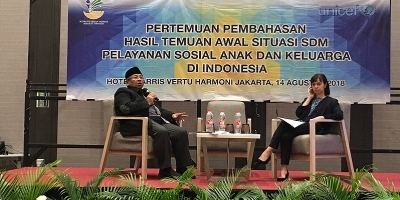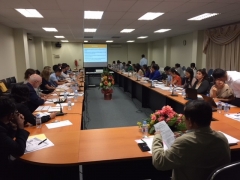
Day 2, September 25, Social Service Workforce Week
To support appropriate responses through effective child protection, as well as justice, health, education and quality care interventions, it is imperative to have a strong protection system in place. One critical element of this system is an effective social service workforce with a clear mandate, appropriate resources and relevant training and supervision. However, limited data about the workforce and the systems that support it makes it challenging for governments and partners to identify and implement evidence-based solutions to strengthen the social service workforce.
During Social Service Workforce Week, the Global Social Service Workforce Alliance aims to highlight the importance of mapping and assessing the current status of the workforce, included as a national level goal in the Call to Action for Strengthening the Social Service Workforce to Better Protect Children and Achieve the SDGs currently underway in many countries with the leadership of the national level groups.
|
The Global Social Service Workforce Alliance has provided input into workforce mapping and assessments in 37 countries. Currently, the Alliance is carrying out workforce assessments in six countries within the East Asia and Pacific region and eight countries within the Middle East and North Africa region in collaboration with UNICEF Regional and Country Offices. In addition, the Alliance completed a scoping of eight countries in South Asia, documented in the State of the Social Service Workforce in South Asia Report and 15 countries globally as described in our 2015 State of the Social Service Workforce Report. Each of these assessments is structured around the Framework for Strengthening of the Social Service Workforce developed through consultations with a wide range of stakeholders globally and intended to guide country efforts for planning, developing and supporting the workforce.
|
Applying the Alliance-tested approach, national workforce leadership groups ensure contextualization of the assessment methodology and tools and support their application in the each country. Groups advise on the definition of the social service workforce, sampling and data collection, assessment process and priority actions for strengthening and advocating for the social service workforce as applicable to the country.
Workforce assessments aim to establish a baseline of information and data on the status of the social service workforce in each country in order to guide and assist country-level action plans toward strengthening the social service workforce. With this broader goal in mind, the mapping process is meant to:
- Examine the availability of workforce-supportive legislation and policies
- Identify availability and duration of different levels of education and training
- Document the existence and role of professional associations and regulatory bodies that establish licensing, competency standards and/or a professional code of ethics
- Record the number of professional and para professional workers at the national and subnational levels, in government and non-government positions
- Assess workers’ perceptions of work environment, supervision, job satisfaction, professional development, incentive systems and career paths.
Country experience of mapping the social service workforce
In Jordan, the Country-level Task Group led by the Ministry of Social Development has identified several key initiatives that will be informed and supported by the mapping and review, including the Social Work Professionalization initiative underway in the country. The high-level officials of the Ministry are also keen to share the Jordan experience of understanding workforce and strengthening its components at the level of the League of Arab States, as an example for other countries.
Indonesia has achieved significant advances in data collection for reviewing its workforce. Findings from a survey of 1,180 professional and paraprofessional workers employed by the state and non-state entities were discussed at the national stakeholder meeting held in Jakarta in August 2018. According to Dr. Kanya Eka Santi, Secretary for Director General of Social Welfare, preliminary findings will already be of use for the country, as the research and education body is currently working on identifying training needed for social service workers.
 Maryam S.V. Nainggolan, Secretary General of the Consortium of Social Work of Indonesia, composed of 13 state and non-state social welfare organizations, acknowledged the importance of the new data for informing the legislation currently being developed in the country. The process of advocating for and drafting laws to professionalize and strengthen the workforce, initiated in 2012 at Bandung School of Social Work, will benefit from efforts to assess the social service workforce in Indonesia. “We need to have a good communication strategy to advocate for strengthening social work practice, and this is our responsibility. Findings of this mapping and assessment will contribute to our advocacy work on Social Work Practice Law,” says Mrs. Nainggolan.
Maryam S.V. Nainggolan, Secretary General of the Consortium of Social Work of Indonesia, composed of 13 state and non-state social welfare organizations, acknowledged the importance of the new data for informing the legislation currently being developed in the country. The process of advocating for and drafting laws to professionalize and strengthen the workforce, initiated in 2012 at Bandung School of Social Work, will benefit from efforts to assess the social service workforce in Indonesia. “We need to have a good communication strategy to advocate for strengthening social work practice, and this is our responsibility. Findings of this mapping and assessment will contribute to our advocacy work on Social Work Practice Law,” says Mrs. Nainggolan.
 Similarly, Cambodia echoes the national level goal on mapping of the social service workforce outlined in the Call to Action. Guided by the Action Plan for Improving Child Care and other national strategies, the country is implementing child care system reform aimed at family strengthening, development of alternative care options and reducing reliance on institutional care. The key role of the social service workforce in achieving these objectives and the importance of having current workforce data is fully acknowledged by the Ministry of Social Affairs, Veterans and Youth Rehabilitation of Cambodia and other partners in Cambodia.
Similarly, Cambodia echoes the national level goal on mapping of the social service workforce outlined in the Call to Action. Guided by the Action Plan for Improving Child Care and other national strategies, the country is implementing child care system reform aimed at family strengthening, development of alternative care options and reducing reliance on institutional care. The key role of the social service workforce in achieving these objectives and the importance of having current workforce data is fully acknowledged by the Ministry of Social Affairs, Veterans and Youth Rehabilitation of Cambodia and other partners in Cambodia.
”Family Care First wholeheartedly supports the mapping of the social service workforce in Cambodia. We believe that the mapping will enable us, in partnership with the government, UNICEF and other NGOs, to more effectively plan our support services to the workforce. This will enable us to improve our targeting of support to vulnerable children and their families in Cambodia,” says John Statham, Senior Social Work Technical Advisor at Family Care First, Save the Children Cambodia. Save the Children, Social Services Cambodia and Family Care First have signed on to the Call to Action in a show of support for workforce strengthening efforts for implementing care reform.
Commitment of key stakeholders, including UNICEF at the global, regional and national levels, to gather details about the structure and needs of this workforce in different countries offers a strong opportunity for sharing promising practices and taking a systematic approach to strengthening the social service workforce.
The Alliance will soon produce a mapping toolkit, to be released in 2019, that will offer step- by-step guidance for carrying out national workforce assessments.
_________________________________________________________________________________________________________________
|
To date, 31 organizations have joined the Call to Action. Some examples of how these organizations are supporting workforce strengthening:
|
_________________________________________________________________________________________________________________
Get Involved in Social Service Workforce Week
Join us this week in advocating for social service workers. Daily emails include a blog, links to resources, organization efforts underway and ways to get involved. We encourage you to share today's email and other resources from the week.
Day 1, September 24: A Call to Action: Strengthening the Social Service Workforce to Better Protect Children and Achieve the
SDGs
Day 3, September 26: Development of a National Social Service Workforce Strengthening Strategy
Day 4, September 27: Ending Violence Against Children Requires a Strong Social Service Workforce
Day 5, September 28: Actions for Realizing a Stronger Social Service Workforce
We encourage you to get involved through the following methods:
- Join the Twitter chat TODAY from 09:00-10:00 EDT to share the importance of a strong social service workforce for protecting children & achieving the SDGs. Follow and tag @SSWAlliance.
- Download the Call to Action and share with your network. Available in English and Spanish.
- Register for the webinar on Thursday, September 27: Ending Violence Against Children Requires a Strong Social Service Workforce, being jointly organized with UNICEF and the Global Partnership to End Violence. In advance of the webinar, review some best practices of integrating the social service workforce within National Plans of Action.
- Circulate this email and the other daily blogs during to raise awareness and increase the number of supporters for strengthening the social service workforce. Or, invite a colleague to become a member, and they will receive updates directly.
- Further your support through a donation to the Global Social Service Workforce Alliance. Contributions will be used to support the Alliance’s work toward strengthening the workforce.
- Download resources from the Alliance library and share resources from your organization.
